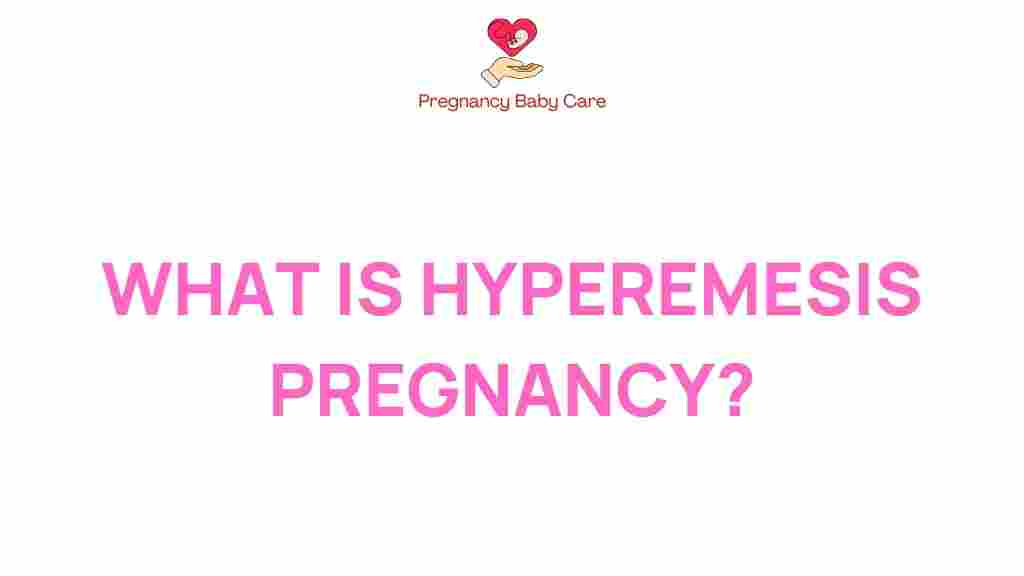Unraveling Hyperemesis in Pregnancy: What You Need to Know
Pregnancy is often portrayed as a beautiful journey filled with joy and anticipation. However, for some women, this journey can be overshadowed by a condition known as hyperemesis. This severe form of nausea and vomiting during pregnancy can lead to serious complications if not addressed properly. In this article, we will explore the symptoms, complications, treatment options, and support available for those affected by hyperemesis in pregnancy.
Understanding Hyperemesis in Pregnancy
Hyperemesis gravidarum (HG) is a pregnancy complication characterized by extreme nausea and vomiting. Unlike typical morning sickness, HG can result in significant weight loss, dehydration, and nutritional deficiencies. Understanding the nuances of this condition is crucial for expectant mothers and their support systems.
Symptoms of Hyperemesis
The symptoms of hyperemesis can vary in severity and duration. Common symptoms include:
- Severe, persistent nausea
- Frequent vomiting
- Weight loss (more than 5% of pre-pregnancy weight)
- Dehydration (indicated by dark urine, dry mouth, and dizziness)
- Electrolyte imbalances
- Inability to keep food or fluids down
- Fatigue and weakness
Complications Associated with Hyperemesis
Hyperemesis can lead to a range of complications for both mother and baby if left untreated. Some potential complications include:
- Dehydration: This can cause kidney problems and affect overall health.
- Malnutrition: Lack of essential nutrients can impact fetal development.
- Weight loss: Excessive weight loss can lead to growth issues for the baby.
- Hospitalization: Severe cases may require intravenous fluids and medications.
- Psychological stress: The emotional toll can lead to anxiety and depression.
How Hyperemesis is Diagnosed
Diagnosis of hyperemesis typically involves a combination of medical history review, physical examination, and blood tests. Healthcare providers will assess the severity of symptoms and may perform tests to check for dehydration and electrolyte imbalances.
Step-by-Step Process for Managing Hyperemesis
Managing hyperemesis during pregnancy requires a comprehensive approach. Here’s a step-by-step process to help navigate this condition:
1. Seek Medical Attention
If you experience severe nausea and vomiting, it’s essential to consult your healthcare provider. Early intervention can prevent complications.
2. Stay Hydrated
Dehydration is a significant concern with hyperemesis. Aim to:
- Drink small sips of water or electrolyte solutions.
- Consume clear broths or ginger tea, which may soothe your stomach.
3. Nutritional Support
When nausea makes eating difficult, consider the following:
- Eat small, frequent meals to avoid overwhelming your stomach.
- Focus on bland foods like crackers, rice, or plain toast.
- Incorporate high-protein snacks when possible to maintain energy levels.
4. Medications
Your doctor may prescribe medications to help control nausea and vomiting. Some common options include:
- Pyridoxine (Vitamin B6)
- Doxylamine
- Ondansetron
5. Consider Alternative Therapies
Some women find relief through alternative therapies, such as:
- Acupuncture
- Aromatherapy with essential oils (like peppermint or lemon)
- Ginger supplements or teas
6. Emotional Support
Dealing with hyperemesis can be emotionally taxing. Seek support from:
- Your partner, family, and friends
- Support groups for women experiencing similar challenges
- Professional counseling if needed
Troubleshooting Tips for Managing Symptoms
While the symptoms of hyperemesis can be challenging, there are several strategies you can employ to alleviate discomfort:
- Keep a food diary to identify triggers that worsen nausea.
- Rest as much as possible; fatigue can exacerbate symptoms.
- Try ginger candies or ginger ale to ease nausea.
- Adjust your environment by avoiding strong smells or spicy foods.
Support and Resources
Finding the right support is critical for managing hyperemesis. Resources available include:
- Hyperemesis Education and Research Foundation – Offers information and support for those affected.
- Local support groups or online communities where you can share experiences.
- Consulting with a dietitian specialized in maternity care.
Conclusion
Hyperemesis in pregnancy is a serious condition that can significantly affect a woman’s health and well-being. Recognizing the symptoms and understanding the potential complications is vital for timely treatment and support. If you or someone you know is struggling with hyperemesis, remember that you are not alone. Reach out for help, advocate for your health, and seek the support you need to navigate this challenging condition.
For more information on maternal care and managing pregnancy-related issues, check out our comprehensive guide on pregnancy wellness.
This article is in the category Pregnancy and created by PregnancyBabyCare Team
